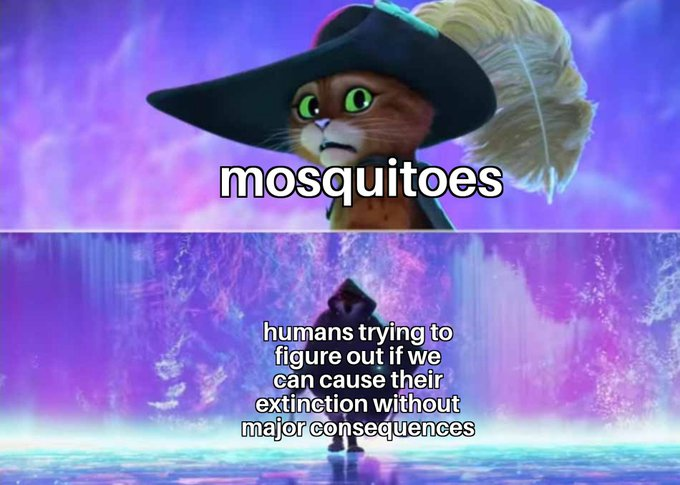this post was submitted on 16 Oct 2024
721 points (98.7% liked)
memes
10163 readers
2890 users here now
Community rules
1. Be civil
No trolling, bigotry or other insulting / annoying behaviour
2. No politics
This is non-politics community. For political memes please go to [email protected]
3. No recent reposts
Check for reposts when posting a meme, you can only repost after 1 month
4. No bots
No bots without the express approval of the mods or the admins
5. No Spam/Ads
No advertisements or spam. This is an instance rule and the only way to live.
Sister communities
- [email protected] : Star Trek memes, chat and shitposts
- [email protected] : Lemmy Shitposts, anything and everything goes.
- [email protected] : Linux themed memes
- [email protected] : for those who love comic stories.
founded 1 year ago
MODERATORS
you are viewing a single comment's thread
view the rest of the comments
view the rest of the comments

Just a guess... they're probably a food source low in the chain. Disrupt the food chain and we're screwed.
https://www.britannica.com/story/what-purposes-do-mosquitoes-serve-in-ecosystems
Everything I've read suggests that mosquitoes aren't a primary food source for anything, and that their absence would be relatively easily adusted for by those creatures that do eat them. Still, that's a hell of a dice roll.
Edit: And apparently that may be wrong anyway.
I have argued for the same caution every single time this came up on Reddit, because I know of a dozen examples in history where we fucked up something similar.
I got downvoted every single time, across several posts over the years, because obviously the hive mind believes things will be different this time! The thing that males me confident it'll fail is I've never seen, and nobody's ever provided, an example where this type of ecological engineering has actually succeeded for the better.
The biggest reason it may be different this time is previously we were all like, "let's exterminate dogs," and it turns out dogs are important. This time is more like "let's exterminate pitbulls." There will still be plenty of mosquitos around if the plan is ever put into motion, we are only targeting a very small slice of them. That doesn't mean there won't be issues, it could well be just as big a mistake as all the previous times. But at least it is more likely to work out.
What makes you so confident that this super sophisticated "selective targeting" is 100% guaranteed? What if the species who has killed off 10-100% of every animal population on the planet, in 1 thousandth the time most of them took to evolve, isn't as smart as they consider themselves to be? What if the talking chimps, with a few decades education, missed something and end up accidentally exterminating all mosquitos? How many animals and ecosystems depend on an animal that's existed for longer than most terrestrial species? What if our weapon spreads to other arthropods with a similar DNA and "exterminates" insect species around the world, who are already in a historic rate of decline, right after we've degraded every habitat on Earth, just as our unplanned terraform irrevocably alters their climate forever?
Are any of these risks worth millions of human lives? Maybe we should focus on altering ourselves? At least then our failures will be contained...
Well, like I said, there is still a chance of collateral damage, which is why there has been so much study to try and make sure that isn't going to happen. We've been sitting on the ability to do this for a long time. As for chances of killing other species, I don't think that is a risk from the method. They basically just breed mosquitoes of the targeted breed, and modify their genes so they can only have male offspring which can also only produce male offspring, etc.